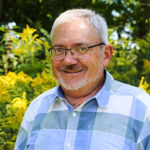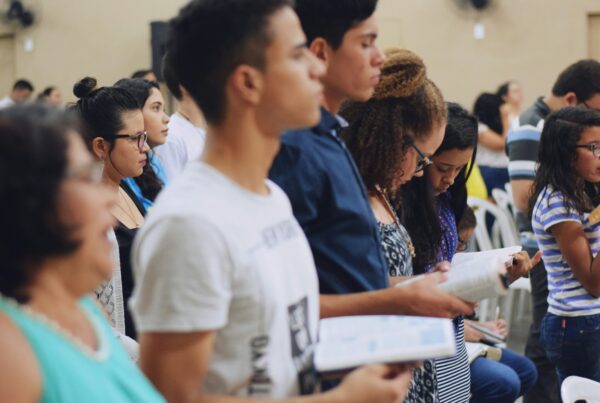F ollowing a frustrating experience at a large, church-sponsored conference that intended to be accessible to people with disabilities but fell short of the mark, a group of church members who are blind or visually impaired are sharing several best practices to help churches and event planners become more welcoming.
Steve Timmermans, then serving as executive minister of the Christian Reformed Church in North America, had invited disability advocates attending Inspire 2019 to contact him about their concerns. Following Inspire, Mana Hashimoto and Casey Dutmer, who are totally blind, and Cassie Lokker, who is legally blind but has some light sensitivity, were upset enough to do just that: to provide honest feedback and make their frustrations known to the conference planners.
But they didn’t stop there. As disability advocates for their home churches who are committed to improving accessibility and welcome for anyone with a disabling condition, they decided to turn their conference frustrations into something constructive to benefit churches and future conferences.
“Some blind people have said to me, ‘We don’t have much hope in the secular message, so if the church’s message is no different, then what’s the point of attending?’” Dutmer says. “I commended the effort of the Inspire planning team, even though there were many problems. If the feedback we offered to Inspire is taken seriously, I believe it’s possible that the disability community at some point will be able to feel included.”
After Inspire 2019, Hashimoto spoke with Dutmer about gathering other church members who are blind and visually impaired to address common barriers they face in churches and beyond. They joined with Lokker to gather nearly a dozen members of Reformed Church in America and Christian Reformed Church in North America congregations who are blind or have low vision. Meeting monthly by conference call, the group has created five articles, linked below, outlining best practices for welcoming, including, and engaging people who are blind or visually impaired in the life of the church.
“Even within disability-sensitive communities, supports for people who are blind or have low vision have been lacking or very far behind,” Hashimoto says. “There’s also a failure to understand the differing needs among people who are totally blind and those who are blind but have some light sensitivity. That’s why I have been so encouraged by the work of this group.”
As a general rule, if accommodations are not possible or there’s uncertainty about how to proceed, it’s always best to talk with those who would benefit so leaders and helpers can best anticipate what is needed and determine appropriate solutions in conversation with people with disabilities.
“I know not everything can be perfect for everyone, but hopefully being aware of these challenges to participation will make it easier for people who are blind or visually impaired to belong and to serve,” says Lokker.
Resources and guidelines for best practices
- Every church should be a place where everyone belongs and everyone serves, but often people with disabilities are inadvertently overlooked and not able to participate fully in the life of the church. In addition, they often have difficulty advocating for themselves and their needs. This article will help church members better understand those barriers and provides tips for advocating for people who are blind or have low vision.
- Due to a variety of reasons, socializing can often be a challenge for people who are blind or have low vision. Learn about six common challenges and possible solutions.
- Even in the church, several disempowering attitudes exist that isolate people who are blind or have low vision and exclude them from certain parts of church life. This resource responds to two basic questions: Where do these attitudes come from, and how can we improve these issues?
- One way to better include people who are blind or have low vision is to provide accessible communication. Find out what those best practices are, including specifics on electronic and large-print documents, guidelines for worship, and projection materials.
- Planning a meeting or event? Ensure that all participants with visual impairments can participate fully and safely. Read these guidelines for creating accessible materials and documents, preparing an inclusive registration site, and being mindful during the meeting.

Terry DeYoung
Terry A. DeYoung served as coordinator for disability concerns for the Reformed Church in America for 13 years before his retirement in 2023. His wife, Cindi Veldheer DeYoung, is a former hospital chaplain who lives with significant hearing loss. They live in Holland, Michigan, with their lively Brittany Spaniel, Dexter. Among other things, they enjoy traveling, boating, baseball, craft beer, and all things Chicago.



